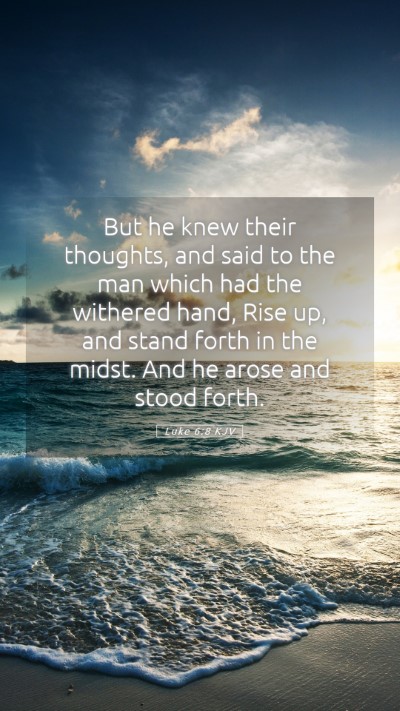Bible Verse Meaning: Luke 6:8
Luke 6:8 states: "But he knew their thoughts, and said to the man which had the withered hand, Rise up, and stand forth in the midst. And he arose and stood forth."
Understanding Luke 6:8
This verse is part of a narrative where Jesus is confronted by religious leaders regarding his actions on the Sabbath. He demonstrates his understanding of their intentions and performs a miraculous healing.
Commentary Insights
Combining insights from Matthew Henry, Albert Barnes, and Adam Clarke, we gain a deeper understanding of this passage:
- Contextual Background: The setting of this miracle is critical, as it takes place on a Sabbath, which was a day of rest according to Jewish law. By healing on this day, Jesus challenges the legalistic interpretations of the law held by the Pharisees.
- Divine Knowledge: Matthew Henry emphasizes the divine knowledge of Christ, noting that he is fully aware of the thoughts and intentions of the Pharisees. This illustrates his omniscience and sets the stage for the miracle.
- The Withered Hand: Adam Clarke suggests that the man with the withered hand represents those who are spiritually disabled. Jesus’ command for him to stand forth highlights the call for faith and action in the face of adversity.
- Boldness in Faith: Albert Barnes points out that Jesus’ command to the man is an act of boldness, calling him to stand in the midst of those who might oppose him. It symbolizes the courage needed to stand up for one’s faith.
- The Act of Healing: The act of healing on the Sabbath by Jesus serves to illustrate that doing good and showing mercy is always appropriate, regardless of tradition. This reflects the essence of Jesus’ ministry and his willingness to confront social and religious norms.
- Application for Believers: The excerpt highlights the importance of responding to Jesus' call, emphasizing the need for believers to rise and be active in their faith, even when faced with societal or institutional disapproval.
Application of the Verse
Luke 6:8 invites readers to reflect on their own spiritual state:
- Personal Reflection: What areas of your life need healing or restoration? Are there spiritual atrophies that require the hand of God to restore?
- Bold Discipleship: The passage encourages believers to boldness in faith, calling individuals to stand for their beliefs, even in challenging environments. Just as the man was called to stand forth, Christians are also called to be visible representatives of Christ’s love and power.
- Doing Good: It calls on all to show compassion and do good, recognizing that acts of kindness often defy conventions and are rooted in Christ's command to love others.
Historical Context
The tension between Jesus and the Pharisees is ongoing throughout the Gospels. In this instance, Jesus confronts societal norms that prioritize ritual over compassion. This reflection resonates strongly today, where legalism can sometimes overshadow the core message of love and grace.
Related Bible Verses
- Matthew 12:10-14: Discusses another healing on the Sabbath where Jesus questions the legality of doing good on the holy day.
- Mark 3:1-6: Provides a parallel account of the withered hand miracle, emphasizing Jesus' profound concern for human suffering.
- Hebrews 4:15: Speaks to Jesus’ understanding of our weaknesses, affirming that He is capable of empathy and healing.
Conclusion
The passage of Luke 6:8 serves as a powerful reminder of Christ's authority, compassion, and the necessity for believers to actively engage with their faith. It is a call to embody the principles of love and action, particularly in the face of societal pressure. Such insights are invaluable for anyone seeking Bible verse meanings, Bible verse interpretations, and a clearer understanding of Scripture.
Engaging with Scripture
This verse, like many others, can lead to fruitful discussions in Bible study groups. For further engagement, consider utilizing Bible study tools and Bible study materials to enhance your understanding.


